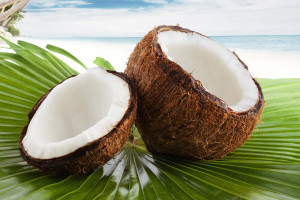Written by Angeline A. De Leon, Staff Writer. Coconut milk rich in saturated fat significantly reduced low density lipoprotein (LDL) and significantly increased high density lipoprotein (HDL) in the 60 participating healthy adults living in Sri Lanka.
 In the study of heart disease, one of the major points of controversy involves the role of saturated fats in atherosclerotic disease. While several studies have shown that dietary restriction of saturated fat can effectively prevent ischemic heart disease (involving obstruction of blood vessels) 1,2, other investigations provide clear evidence for reduced risk of coronary disease with higher saturated fat intake 3. In 2003, the World Health Organization even published a report asserting the absence of a direct link between daily fat consumption and increased risk of vascular disease 4. On the basis of the “Polynesian paradox” (the observation that high fat intake from coconut-based foods confers a protective effect against atherosclerosis in Polynesians), supplementation with coconut has been used as an active dietary strategy for heart disease prevention 5, however, clinical evidence is still lacking. In order to better understand how saturated fat from coconut and coconut-based products influences lipid profile, a 2013 study published in the Journal of Nutrition and Metabolism looked at the effects of natural (unmodified by hydrogenation) coconut milk in a group of community-dwelling adults in Sri Lanka.
In the study of heart disease, one of the major points of controversy involves the role of saturated fats in atherosclerotic disease. While several studies have shown that dietary restriction of saturated fat can effectively prevent ischemic heart disease (involving obstruction of blood vessels) 1,2, other investigations provide clear evidence for reduced risk of coronary disease with higher saturated fat intake 3. In 2003, the World Health Organization even published a report asserting the absence of a direct link between daily fat consumption and increased risk of vascular disease 4. On the basis of the “Polynesian paradox” (the observation that high fat intake from coconut-based foods confers a protective effect against atherosclerosis in Polynesians), supplementation with coconut has been used as an active dietary strategy for heart disease prevention 5, however, clinical evidence is still lacking. In order to better understand how saturated fat from coconut and coconut-based products influences lipid profile, a 2013 study published in the Journal of Nutrition and Metabolism looked at the effects of natural (unmodified by hydrogenation) coconut milk in a group of community-dwelling adults in Sri Lanka.
A total of 60 healthy subjects (aged 18-57) were assigned to consume 200 mL of either coconut milk porridge (CMP) or isoenergetic soya milk porridge (SMP) for five days of the week for eight weeks. Participants then observed a 2-week washout period without supplementation, after which they were reassigned to the alternate arm of the study for another eight weeks. At baseline and following the first feeding period, the washout period, and the second feeding period, respectively, participants provided fasting blood samples which enabled estimation of serum lipids.
Findings showed that the difference in mean values between baseline and post-intervention levels of low density lipoprotein (LDL, known as “bad cholesterol”) was significantly diminished (-14.9 mg/dL +/- 6.2 mg/dL, p = 0.02) with CMP supplementation. Likewise, high density lipoprotein (HDL, known as “good cholesterol”) was significantly increased with CMP supplementation from baseline to post-intervention (9.6 mg/dL +/- 1.6 mg/dL, p < 0.01).
Study results signify that dietary consumption of saturated fat in the form of coconut milk has a positive impact on lipid parameters, effectively raising HDL levels while reducing LDL. Contrary to previous findings suggesting possible detrimental health effects of coconut fat on serum lipid profile, the current study supports the traditional culinary use of coconut milk as a safe dietary product with special benefits for vascular health. It would be critical for future work to verify the study findings in a population sample whose habitual intake of coconut-based products is more varied in frequency, at least relative to Polynesian populations.
Source: Ekanayaka RAI, Ekanayaka NK, Perera B, et al. Impact of a traditional dietary supplement with coconut milk and soya milk on the lipid profile in normal free living subjects. Journal of Nutrition and Metabolism. 2013. DOI: 10.1155/2013/481068.
© 2013 R. A. I. Ekanayaka et al. This is an open access article distributed under the Creative Commons Attribution License, which permits unrestricted use, distribution, and reproduction in any medium, provided the original work is properly
Click here to read the full text study.
Posted July 11, 2017.
Angeline A. De Leon, MA, graduated from the University of Illinois at Urbana-Champaign in 2010, completing a bachelor’s degree in psychology, with a concentration in neuroscience. She received her master’s degree from The Ohio State University in 2013, where she studied clinical neuroscience within an integrative health program.
References:
- Dayton S, Pearce ML, Hashimoto S, Dixon WJ, Tomiyasu U. A controlled clinical trial of a diet high in unsaturated fat in preventing complications of atherosclerosis. Circulation. 1969;40(1S2):II-1-II-63.
- Turpeinen O, PEKKARINEN M, MIETTINEN M, ELOSUO R, PAAVILAINEN E. Dietary prevention of coronary heart disease: the Finnish Mental Hospital Study. International Journal of Epidemiology. 1979;8(2):99-118.
- Mozaffarian D, Rimm EB, Herrington DM. Dietary fats, carbohydrate, and progression of coronary atherosclerosis in postmenopausal women. The American journal of clinical nutrition. 2004;80(5):1175-1184.
- WHo J, Organization WH. Diet, nutrition and the prevention of chronic diseases: report of a joint WH. 2003.
- Prior IA, Davidson F, Salmond CE, Czochanska Z. Cholesterol, coconuts, and diet on Polynesian atolls: a natural experiment: the Pukapuka and Tokelau island studies. The American journal of clinical nutrition. 1981;34(8):1552-1561.
